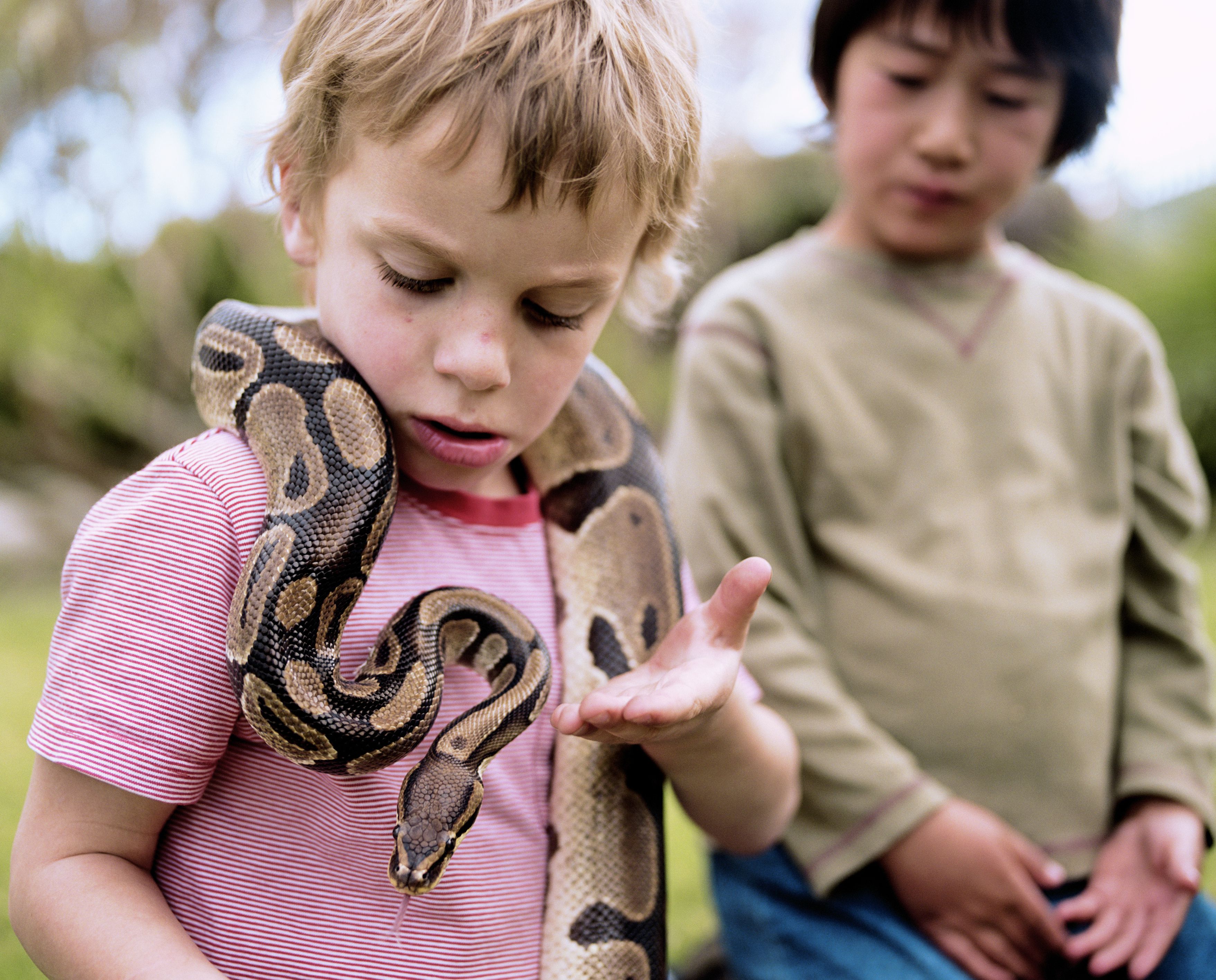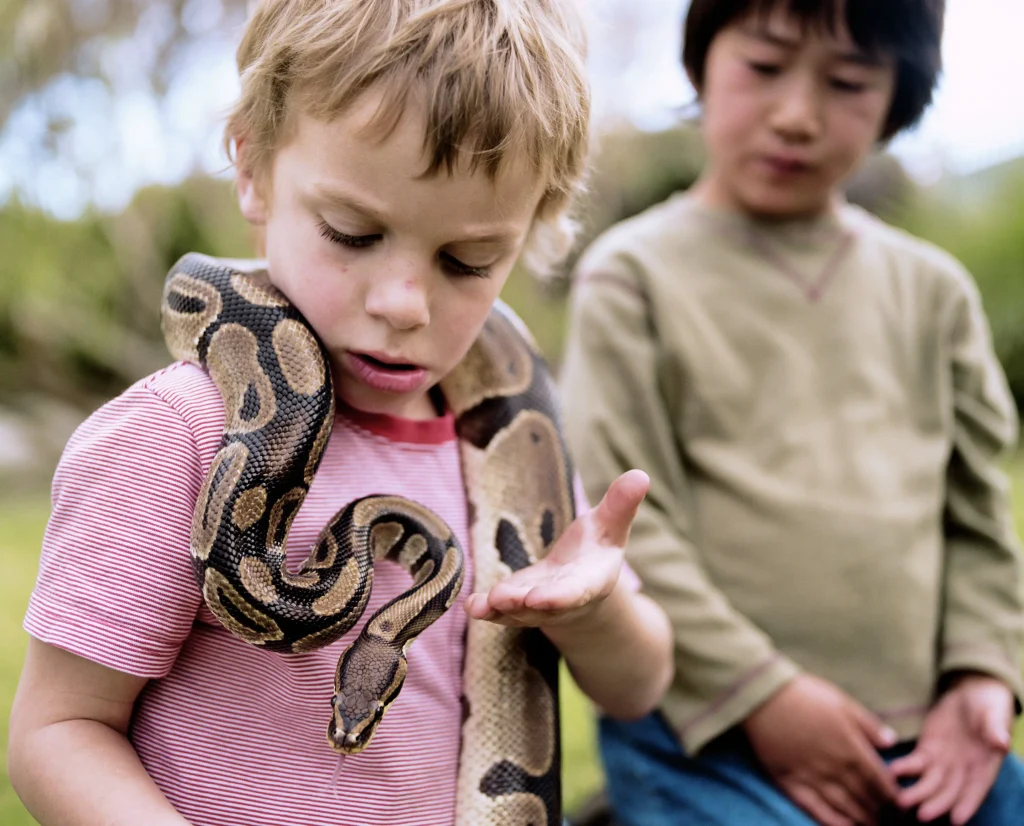If you’re considering getting a pet, you may have come across the idea of getting a python. With their impressive size and striking patterns, pythons are undoubtedly fascinating creatures. But is a python really a good pet for you? In this article, we’ll explore the pros and cons of owning a python and help you decide if it’s the right choice for you.
Pythons are not recommended as pets for most people. They are large, powerful, and potentially dangerous animals that require specialized care. Pythons are also known to live for a long time, up to 20-30 years, which is a significant commitment. Additionally, some species of pythons can grow up to 20 feet long, which makes them difficult to house. If you are considering a python as a pet, make sure to do extensive research and consult with a reptile expert before making a decision.

Do Pythons Make Good Pets?
When it comes to choosing a pet, many people consider getting a python. Pythons are fascinating creatures that can grow quite large and have unique personalities. However, before deciding to bring a python into your home, it’s important to understand the pros and cons of owning one as a pet. In this article, we’ll explore the question of whether pythons make good pets and provide you with the information you need to make an informed decision.
Temperament and Personality
Pythons are generally docile creatures that do not require a lot of attention. They are solitary animals and do not need companionship like dogs or cats. However, they are still social creatures and enjoy being handled and interacted with. Pythons are not aggressive by nature, but they can become aggressive if they feel threatened or provoked. It’s important to handle them with care and respect their personal space.
If you’re looking for a pet that will interact with you frequently, a python may not be the best choice. They are not as social as other pets and may not enjoy being handled for long periods of time. However, they are still fascinating creatures to observe and can make excellent pets for those interested in reptiles.
Size and Housing Requirements
One of the most important things to consider when deciding to get a python as a pet is their size. Pythons can grow quite large, with some species reaching lengths of over 20 feet. This means that they require a large enclosure to live in. The enclosure should be at least as long as the snake and wide enough for them to move around comfortably. It’s also important to provide them with a hiding spot where they can feel safe and secure.
In addition to their size, pythons require specific environmental conditions to thrive. They need a warm and humid environment with plenty of hiding places. They also require a source of heat, such as a heat lamp or heating pad, to regulate their body temperature. If you’re considering getting a python, it’s important to research their specific environmental needs and ensure that you can provide them with a suitable living space.
Diet and Feeding
Pythons are carnivores and require a diet consisting of rodents, birds, and other small animals. They typically eat once every 7-10 days, depending on their size and age. Feeding a python can be a bit of a challenge, as they require live prey. This means that you’ll need to be comfortable handling live rodents and ensuring that they are killed quickly and humanely.
It’s also important to note that feeding a python can be expensive. Live rodents can be costly, and larger pythons may require larger prey items, such as rabbits or chickens. You’ll also need to ensure that the prey is of appropriate size for your python to avoid choking or other health issues.
Health and Care
Like all pets, pythons require regular care to maintain their health. This includes providing them with a clean and suitable living environment, monitoring their diet and feeding schedule, and ensuring that they receive proper veterinary care when needed. Pythons are generally healthy animals, but they can be susceptible to certain health issues, such as respiratory infections or parasites.
It’s important to have a good understanding of your python’s normal behavior and habits so that you can recognize any changes that may indicate a health issue. Regular checkups with a reptile veterinarian can also help you to catch any health issues early on and ensure that your pet stays healthy and happy.
Benefits of Owning a Python
While pythons may not be the best choice for everyone, they do offer several benefits as pets. They are fascinating creatures that can provide endless hours of entertainment and education. They are also low-maintenance pets that do not require a lot of attention or interaction. Additionally, owning a python can be a great way to learn about reptiles and their unique behaviors and characteristics.
Pythons vs. Other Reptiles
If you’re considering getting a reptile as a pet, you may be wondering how pythons compare to other species. Compared to lizards or turtles, pythons are generally less social and do not require as much attention or interaction. They are also less likely to bite or scratch than some lizards or turtles.
However, pythons do require more space and specific environmental conditions to thrive. They also require live prey, which can be a challenge for some pet owners. Ultimately, the decision of which reptile to get as a pet will depend on your personal preferences and the amount of time, space, and resources you have available.
Conclusion
Pythons can make excellent pets for those interested in reptiles and willing to provide them with the specific care and living conditions they require. They are fascinating creatures with unique personalities and behaviors, but they do require a significant amount of space and resources to thrive. If you’re considering getting a python as a pet, it’s important to do your research and ensure that you can provide them with a suitable living environment and proper care.
Frequently Asked Questions
Do Pythons Make Good Pets?
Pythons are not the ideal pet for everyone. While some people find them fascinating and enjoy their unique qualities, others may not be comfortable around large snakes. It is important to do your research and make sure you can provide a proper home for a python before getting one as a pet.
On the other hand, pythons can make great pets for the right person. They are low maintenance and do not require much attention. They also do not need to be walked or exercised like dogs and can be left alone for long periods of time.
What Kind of Habitat Do Pythons Need?
Pythons require a large, secure enclosure with plenty of hiding spots and room to move around. They should have a heat source, such as a heating pad, to maintain their body temperature, as well as a water source for drinking and soaking. The enclosure should be cleaned regularly to prevent bacteria and parasites from building up.
It is important to note that some species of pythons can grow quite large and may require even larger enclosures as they mature. It is also important to research the specific species of python you are considering to ensure you can provide the appropriate habitat.
What Do Pythons Eat?
Pythons are carnivores and eat a diet of rodents, birds, and other small animals. As pets, they are typically fed pre-killed rodents that can be purchased frozen from pet stores. It is important to ensure that the prey is an appropriate size for the python and that it is fed on a regular schedule.
It is also important to note that some species of pythons can grow quite large and may require larger prey as they mature. It is important to research the specific species of python you are considering to ensure you can provide the appropriate diet.
What Are the Dangers of Owning a Python?
While pythons are generally docile and not aggressive towards humans, they are still large snakes that can pose a danger if not handled properly. They have been known to bite or constrict if they feel threatened or stressed.
It is important to handle pythons with care and respect, and to never leave them unattended around children or other pets. It is also important to ensure that the enclosure is secure and that there is no risk of escape.
Is it Legal to Own a Python?
In some areas, it may be illegal to own certain species of pythons as pets. It is important to research the laws in your area before getting a python as a pet. Additionally, some states and countries require permits or licenses for owning certain species of pythons. It is important to ensure that you are in compliance with all relevant laws and regulations.
Ball Python, The Best Pet Reptile?
In conclusion, the decision of whether or not pythons make good pets ultimately depends on the individual’s lifestyle and experience with reptiles. While they can be beautiful and fascinating creatures, they also require specialized care and attention that may not be suitable for everyone.
For experienced reptile owners who are willing to invest the time and effort into providing a suitable environment and proper care, pythons can make excellent pets. They are generally low-maintenance and can be rewarding companions for those who appreciate their unique characteristics.
However, for those who are new to reptile ownership or are not prepared for the commitment involved, pythons may not be the best choice. They can grow quite large and require a significant amount of space, food, and attention. Additionally, they may not be the best choice for households with young children or other pets.
Ultimately, the decision of whether or not to keep a python as a pet should be made carefully and with consideration for the needs of the animal as well as the owner. With proper care and attention, pythons can make fascinating and rewarding pets for those who are up to the challenge.


